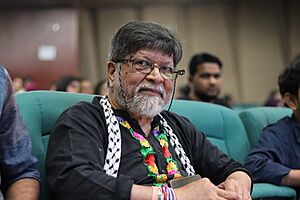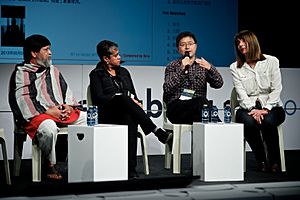Shahidul Alam facts for kids
Quick facts for kids
Shahidul Alam
|
|
|---|---|
| শহিদুল আলম | |

Shahidul Alam in 2024
|
|
| Born | 1955 (age 70–71) |
| Nationality | Bangladeshi |
| Education | Jhenidah Cadet College, University of Liverpool |
| Alma mater | University of Liverpool (BSc) Bedford College, University of London (D.Phil) |
| Occupation | Photojournalism, teaching, social rights activism |
| Known for |
|
| Spouse(s) | Rahnuma Ahmed |
| Parents |
|
| Relatives | Kazi Salahuddin (cousin) Nassakh Nawab Abdul Latif |
| Awards | Ekushey Padak (2025) |
Shahidul Alam (born in 1955) is a famous Bangladeshi photojournalist, writer, and teacher. He is known for building important media organizations and for his work as a social activist.
Alam started several key organizations. He founded Drik Picture Library in 1989, which even helped bring email to Bangladesh early on. He also started Pathshala in 1998, a school for media studies, and the Chobi Mela International Photography Festival in 1999, a big photography event in Asia. In 2004, he created Majority World.
Shahidul Alam has been a photographer for over forty years. His photos have been shown in famous museums like MOMA and Tate Modern. He was also the first Asian person to lead the international jury for World Press Photo, a major photography award. He has given talks at top universities like Oxford and Harvard.
Alam has received many awards for his work. These include an Honorary Fellowship from the Royal Photographic Society in 2001 and the Humanitarian Award from the Lucie Awards in 2018. Time magazine named him one of their "persons of the year" in 2018. He is also an advisor for the National Geographic Society. In 2022, he received an honorary doctorate, but he returned it in 2024 because he disagreed with the university's stance on certain global issues.
Contents
Early Life and Education
Shahidul Alam was born in Dacca, which is now Bangladesh, in 1955. He grew up in the Dhanmondi area. His father, Kazi Abul Monsur, was a doctor, and his mother, Quazi Anwara Monsur, was a child psychologist. His family has a long history in the Faridpur district.
As a child, he rode his small fold-up bicycle through Dhaka's busy streets. He went to a boarding school called Jhenaidah Cadet College.
University Studies and Photography Interest
Alam went to the University of Liverpool in England. There, he studied biochemistry and genetics, graduating in 1976. During his time in Liverpool, he became involved in activism.
Later, he moved to London for his PhD studies at Bedford College, University of London. It was in London that he became very interested in photography. He even worked on new ways to print photos. In 1983, he won an award for one of his photographs, which encouraged him to become a professional photographer. He earned his PhD in organic chemistry in the same year.
Career in Photography and Media
In 1989, Shahidul Alam started Drik Picture Library, a photo agency. Then, in 1998, he founded Pathshala South Asian Media Institute in Dhaka, which has taught many photographers. He also created the Chobi Mela International Photography Festival in 1999, which is a very important photography festival in Asia. He is still its director.
Alam is one of the last photographers to have taken pictures of Nelson Mandela. This happened in 2009 in Johannesburg.
Alam has photographed many important events. These include natural disasters, changes in government, and issues related to human rights. He has also documented protests and challenges faced by people in Bangladesh.
Crossfire Exhibition
Crossfire is a series of photographs by Shahidul Alam. This exhibition was shown at the Drik Gallery in Dhaka in 2010. The photos showed places and objects related to killings that happened outside of normal legal processes, linked to Bangladesh's Rapid Action Battalion (RAB). RAB was formed to fight crime, but it was later accused of many such killings.
Challenges and Activism
Crossfire Exhibition Closure
In 2010, the government tried to close Alam's Crossfire exhibition. They said the photos might cause problems. The Drik Gallery was blocked by police. However, after legal action, the exhibition was allowed to open to the public.
2018 Road Safety Protests
In 2018, Shahidul Alam was arrested after he spoke out about the 2018 Bangladesh road safety protests. He had been documenting these protests with live videos on Facebook and criticized the government's response. He was taken from his home by police officers.
Alam was charged under a law about information and communication technology. He told the court that he had been treated badly while in police custody. The Supreme Court ordered him to be taken to a hospital.
Many international organizations and famous people called for Alam's release. These included Amnesty International, Committee to Protect Journalists, and Reporters Without Borders. Nobel Prize winners, authors, and artists also showed their support using the hashtag #FreeShahidulAlam.
After 107 days in jail, Alam was granted bail by the Bangladesh High Court and released in November 2018. He later challenged the law he was charged under in court.
Biennale für aktuelle Fotografie 2024
In November 2023, a photography event in Germany called the Biennale für aktuelle Fotografie was canceled. This happened because Shahidul Alam had criticized certain actions related to the conflict in the Middle East on his social media. The organizers and city officials felt his comments were problematic.
Alam said that his comments were misunderstood. He explained that he was against certain actions like colonialism and racism, not against any group of people. He felt it was wrong to confuse his criticism of a government's actions with being against a group of people.
Exhibitions of His Work
- 2024: Singed but not burned at Sakshi Art Gallery, Mumbai.
- 2019–2021: Shahidul Alam: Truth to Power at Rubin Museum of Art, New York City.
- 2012: Kochi-Muziris Biennale, Kerala, India.
Awards and Recognition
- 2014: Shilpakala Padak, from Shilpakala Academy, Bangladesh.
- 2018: Humanitarian Award, Lucie Awards.
- 2018: Tribute Award, Frontline Club, UK, for his work in journalism.
- 2019: Special Presentation Award, International Center of Photography (ICP).
- 2020: CPJ International Press Freedom Awards.
- 2025: Ekushey Padak.


